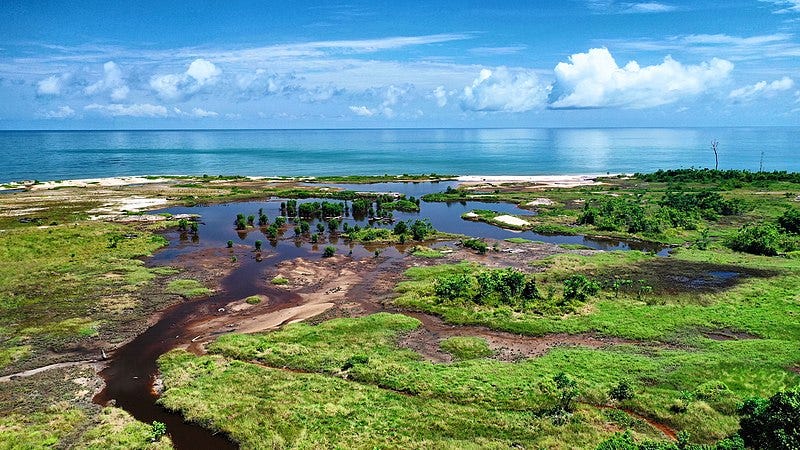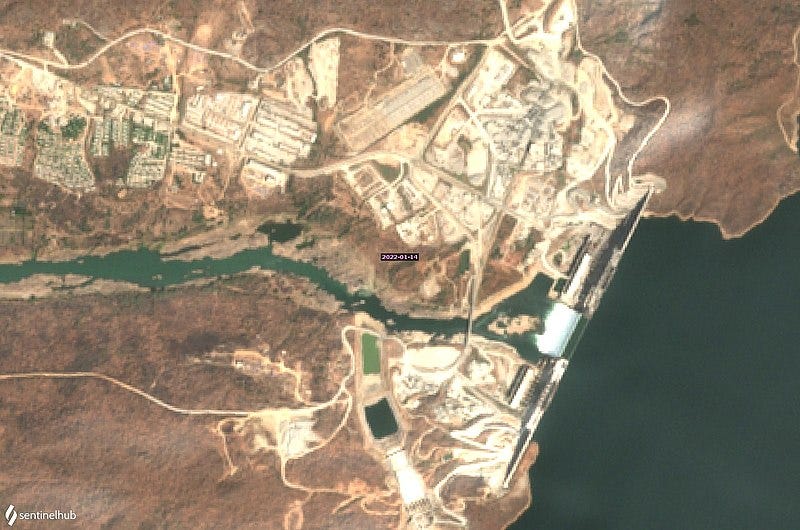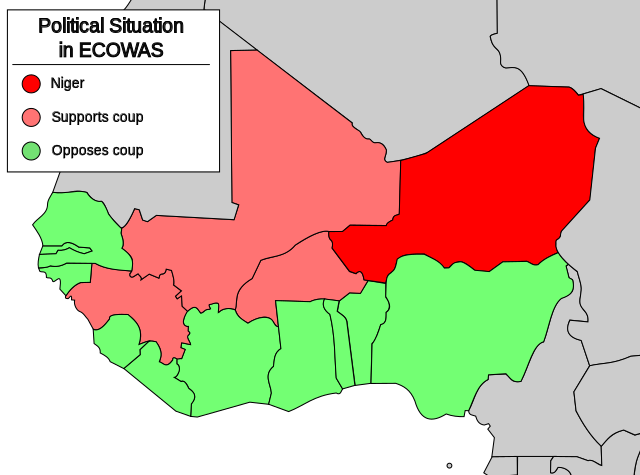🔅 Why Are There HIV Meds In Uganda's Animals? & Germany's Colonial Sins Return
Plus, Egypt Is Not Here For Ethiopia's Dam & Niger Accuses France of Military Intervention
Photo of the day
La mangrove Nyonié au Gabon
Markets:
🔴 Nigerian SE: 67,296.18 (-1.24%)
🟢 Johannesburg SE: 73,652.67 (+0.68%)
🟢 Ghana SE: 3,071.83 (+0.77%)
🟢 Nairobi SE: 99.39 (+0.70%)
🟢 US S&P 500: 4,485.31 (+0.62%)
🟢 Shanghai Composite: 3,142.78 (+0.84%)
*Data accurate as of the close of markets across the continent
Brief & Bright: Africa's Top Five
Uganda's NDA Admits to Keeping Quiet About HIV Meds in Animal Feed

Uganda’s National Drug Authority (NDA) has a confession to make: They knew about HIV medicine being used to fatten up animals since 2014, but they decided not to tell anyone. That’s right—HIV medicine has been found in the chicken and pork from markets in the capital, Kampala, and the northern city of Lira. A senior drugs inspector at the NDA, Amos Atumanya, told parliament that consuming small quantities of the drugs in food could be dangerous. But the NDA says it was afraid of hurting their food exports, so they kept quiet. The dangers of consuming this medicated meat include developing resistance to HIV medicine if you need it in the future. Not good. With 1.4 million people in Uganda living with HIV/Aids, should the NDA do more?
Germany's Colonial Sins Come Back to Haunt Them

Germany’s colonial history is coming back to bite them. Researchers in Berlin have identified living relatives of people whose remains were stolen from Tanzania and taken to Germany for “scientific” experiments during the colonial era. These experiments were a failed attempt at proving the white man was superior to Africans simply by comparing skulls. Through DNA analysis, the researchers were able to match the skulls with living descendants in Tanzania. It’s a small miracle, and the relatives and the government of Tanzania will now be informed. The museum authority said the skulls were part of a collection of about 7,700 acquired by the museum from Berlin’s Charité hospital in 2011. Over the past 20 years, Germany has been gradually starting to talk more about the crimes it committed during the colonial era. In 2021, Germany officially acknowledged that it had committed genocide in Namibia and promised €1bn in financial support to descendants of the victims.
Egypt Is Not Here for Ethiopia's Hydroelectric Dam
Ethiopia has completed the filling of its hydroelectric dam on the Blue Nile River, and Egypt is not happy. Egypt relies on the Nile for nearly all its water needs, and is concerned that Ethiopia’s mega-project will take away some of their share. Ethiopia says it won’t, but that hasn’t stopped Egypt from being mad. The Egyptian foreign ministry called Ethiopia’s actions “illegal” and a “disregard for the interests and rights of the downstream countries and their water security”. The two countries had signed a declaration of principles back in 2015, which stated that they should agree on the rules for filling and operating the dam before commencing the filling process—which Ethiopia apparently didn’t do. The GERD dam is a $4.2bn (£3.4bn) project that Ethiopia hopes will double its electricity output and provide a much-needed development boost for a country where half the population lacks electricity. The plan is for the dam to produce 6,000 KW of energy.
War in Sudan: Six Months In and No End in Sight
The war in Sudan has been raging for six months, and the death toll keeps rising. On Sunday, an air strike by the army on a market in southern Khartoum killed at least 40 civilians and injured dozens more, marking the largest single-incident death toll since the war began. Both the army and the paramilitary Rapid Support Forces have used their respective advantages—air strikes and artillery for the army, and occupying residential areas for the RSF—to try to gain an edge. And while there have been several mediation efforts, none have been successful in stopping the fighting. Residents of southern Khartoum hit by the strike are mainly day workers who are too poor to afford the cost of escaping from the capital. The area is occupied by the RSF, which blames the air strike on the army.
Niger Accuses France of Deploying Troops for an Intervention
France and Niger have been on the outs since the ousting of President Mohamed Bazoum in July. Niger's junta recently called out France for allegedly deploying troops in neighbouring West African countries in preparation for a possible military intervention. French President Emmanuel Macron responded by saying that any decision about French soldiers in Niger would only be made in coordination with Bazoum, but didn’t address the allegations of troop deployment. Regional bloc ECOWAS has slapped sanctions on Niger and claims it is ready to intervene militarily, though talks are ongoing to find a diplomatic solution. Nigeria's President Bola Tinubu has proposed a nine-month transition back to civilian rule, but the junta is pushing for a three-year timeline. Will they reach a compromise?
Food for Thought
“The young bird does not crow until it hears the old ones.”
— Tswana Proverb.
Are we hitting the mark?
Enjoying Baobab's updates? Spread the joy and share us with friends and colleagues — we'd be thrilled to have them join!
Feedback or thoughts? Just hit reply. We're all ears!






